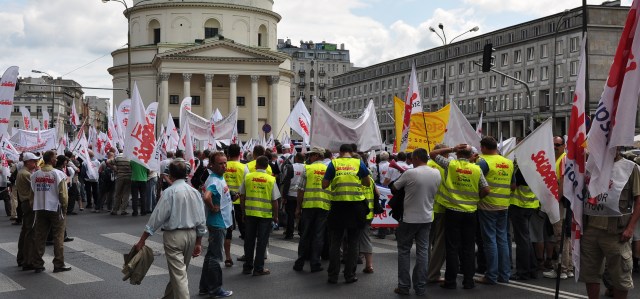Poland is one of the key actors preventing more progressive European climate policies. Why? Polish miners are one of the very few social forces that the Polish government is really afraid of, explains Michal Olszewski.

In the field of coal mining, Polish unions exert a lot of influence on the government in order to preserve the status quo. (Photo by Beemwej, CC BY-SA 3.0 PL)
Even as the former Polish Prime Minister Donald Tusk was still packing his suitcase for his departure to Brussels, where the post of the chairman of the European Council awaited him, there was a significant incident on the Polish-Russian border. Polish miners had blocked the tracks for the trains transporting Russian coal to Poland. Last year, Poland used about 75 million tonnes of coal, 10 percent of which was imported, mainly from Russia, the Czech Republic and the USA. The miners claim that cheap Russian coal is killing the Polish mining industry, and that is why they call for better border controls and stricter quality standards that would cut off the Russian coal imports from the Polish market.
This particular coincidence is significant because Donald Tusk, during his tenure as Polish Prime Minister, was just another politician who ignored the problems with Polish mining. Despite attempts at restructuring, Polish mines cannot compete with the raw material that is ordered from abroad. They are among the most privileged professional groups in the country, and Polish coal is too expensive causing landfills to pile up millions of tonnes of unsold material for several years now.
Over the past quarter-century, Poland has generally supported mining in very different ways. Money did not only go to the necessary restructuring (in the early 90’s, the mines employed about 400,000 workers, this has decreased to 100,000 in 2013), but also into closing unprofitable plants and paying high allowances for laid-off miners. State institutions also dismissed or deferred insurance premiums or fees for any mining damage.
Smoke of the cheapest coal
The following estimates indicate the scale of the phenomenon: between 1990-2012, grants and subsidies for the mining sector totaled US$ 41 billion. Add to this the support for coal-fired power plants between 2005-2012, which was about US$ 12 billion. And let’s add a calculation of the European Environment Agency, which estimates that the external costs of coal combustion caused by sickness, premature death and medical expenses amount to billions of dollars per year. Is this an exaggeration? Perhaps. But to grasp the scale of the problem, it is enough to visit any countryside or mountain resort during the summer season in Poland. In every village and small town, you can smell the smoke of the cheapest kind of coal. Throughout the country, the concentration levels of benzo(a)pyrene, a carcinogenic component of smog, is extremely high. And the average number of days in Krakow with very high levels of PM10 (a component of smog) is 135 per year. Since 2004, there are no more standards for the type of coal that can be burnt in domestic ovens in Poland. As a result, coal mines trade not only high quality coal but mud coal, which turns the air– quite literally –into poison. The health costs of this environmental disaster are being paid for by all Polish citizens, yet there is little public debate on the issue in Poland.
Clear signal
How is this possible? The explanation is simple: Polish miners are one of the very few social forces that the government is really afraid of. Well-organized, determined, obstinate, and with strong political representation, they are ready to arrive in Warsaw and use firecrackers, stones and bolts, which they throw at the windows of various government institutions. It is also a powerful electorate; no Polish politician dares to mess with them. No wonder that Donald Tusk, while still Prime Minister, promised that no single mine in Poland would be closed. He gave the same clear signal that Polish mines would be excluded from any economic calculations that are compulsory for other sectors of Polish industry.
Donald Tusk went to Brussels, and the new Prime Minister, Ewa Kopacz, does not seem to be following in the footsteps of Margaret Thatcher – one of her first decisions was to recapitalize the bankrupt mine responsible for a debt of PLN 280 million. And now the Polish government and Parliament want to quickly introduce legislation that would make Russian coal imports even more difficult.
Michal Olszewski (born 1977) – journalist, reporter, writer. For more than twelve years he worked for Gazeta Wyborcza and Tygodnik Powszechny, where he concentrated mostly on environmental issues. He is engaged in a Krakow-based campaign against air pollution.
Its really unfair to treat whole coutry for problems of one city, ofc Poland got many problems with mines and excessive emissions from power plants, but its just a lie to say any coutryside or especially mountain resort smells bad. Dont know if autor lives in Krakow and got some problems with smog, or never visited any coutryside, but he went too far. Whole article makes few good points on government negligence, but in overall I think it is too much one sided, because Poland its not actually a landfill as this article suggest.
I enjoyed the article. We should take every opportunity to point out how disgusting coal can be. Here’s an air quality map of Poland. There many areas listed as having unhealthy and/or very unhealthy air quality as well as a few with air quality listed as Hazardous.
http://aqicn.org/map/poland/